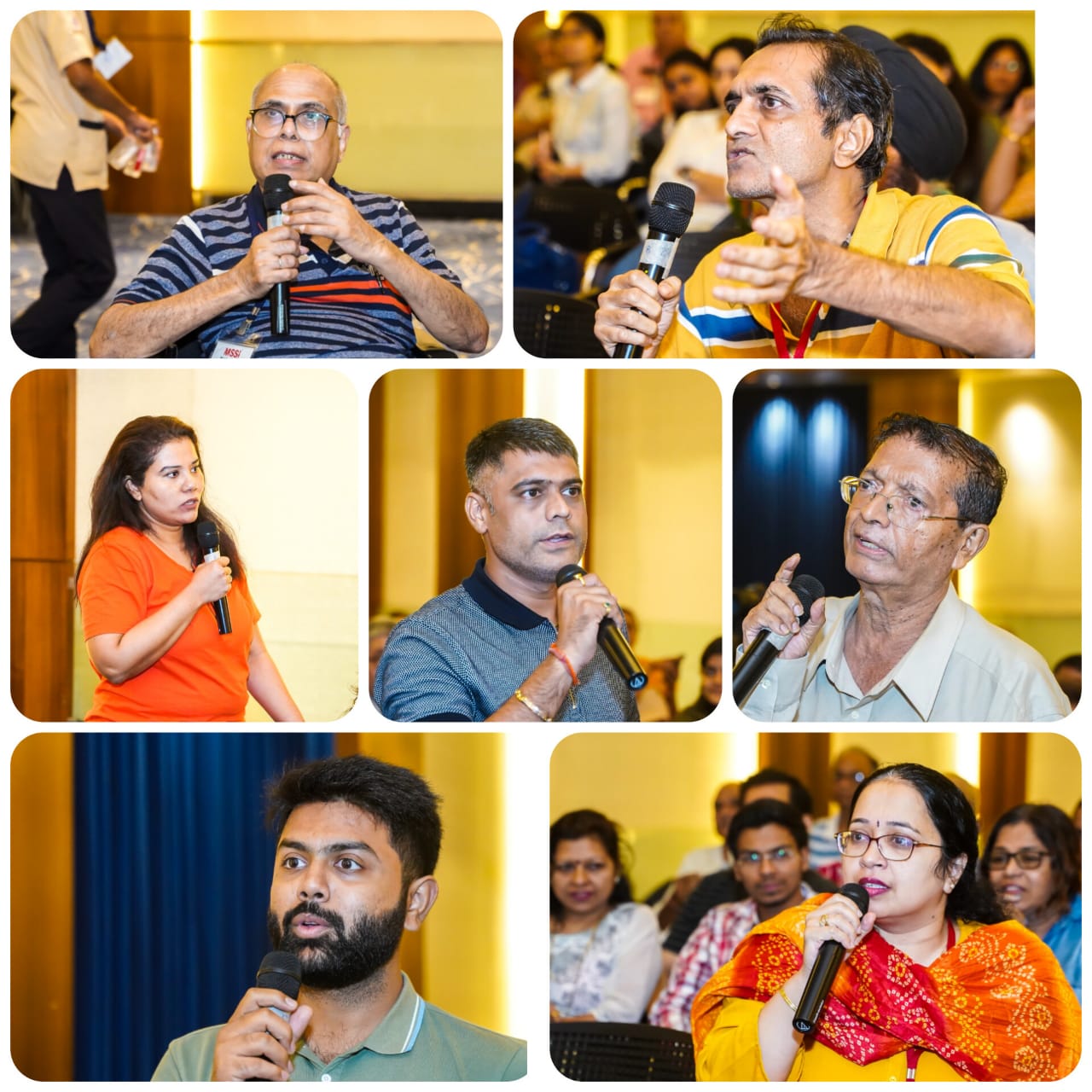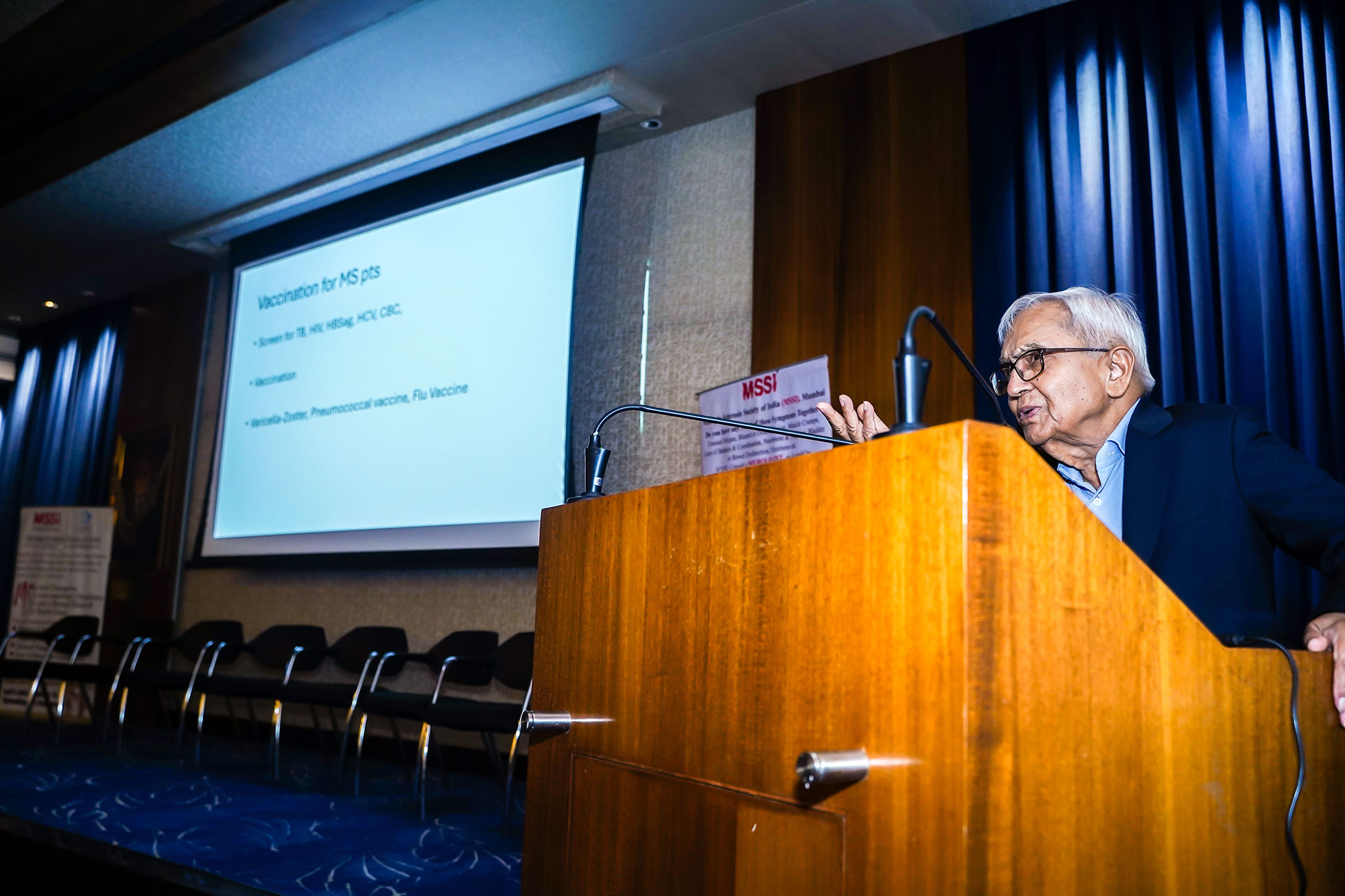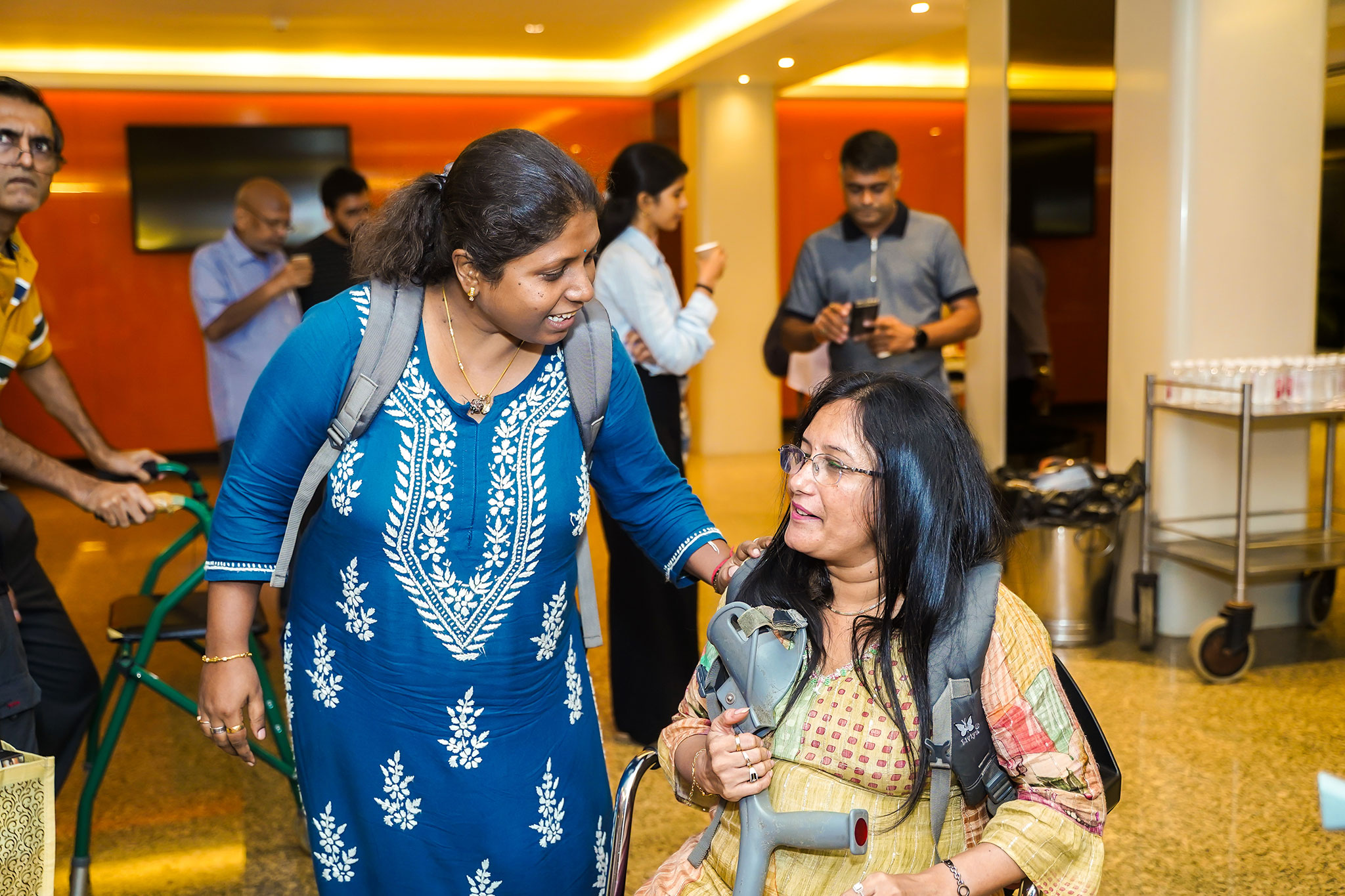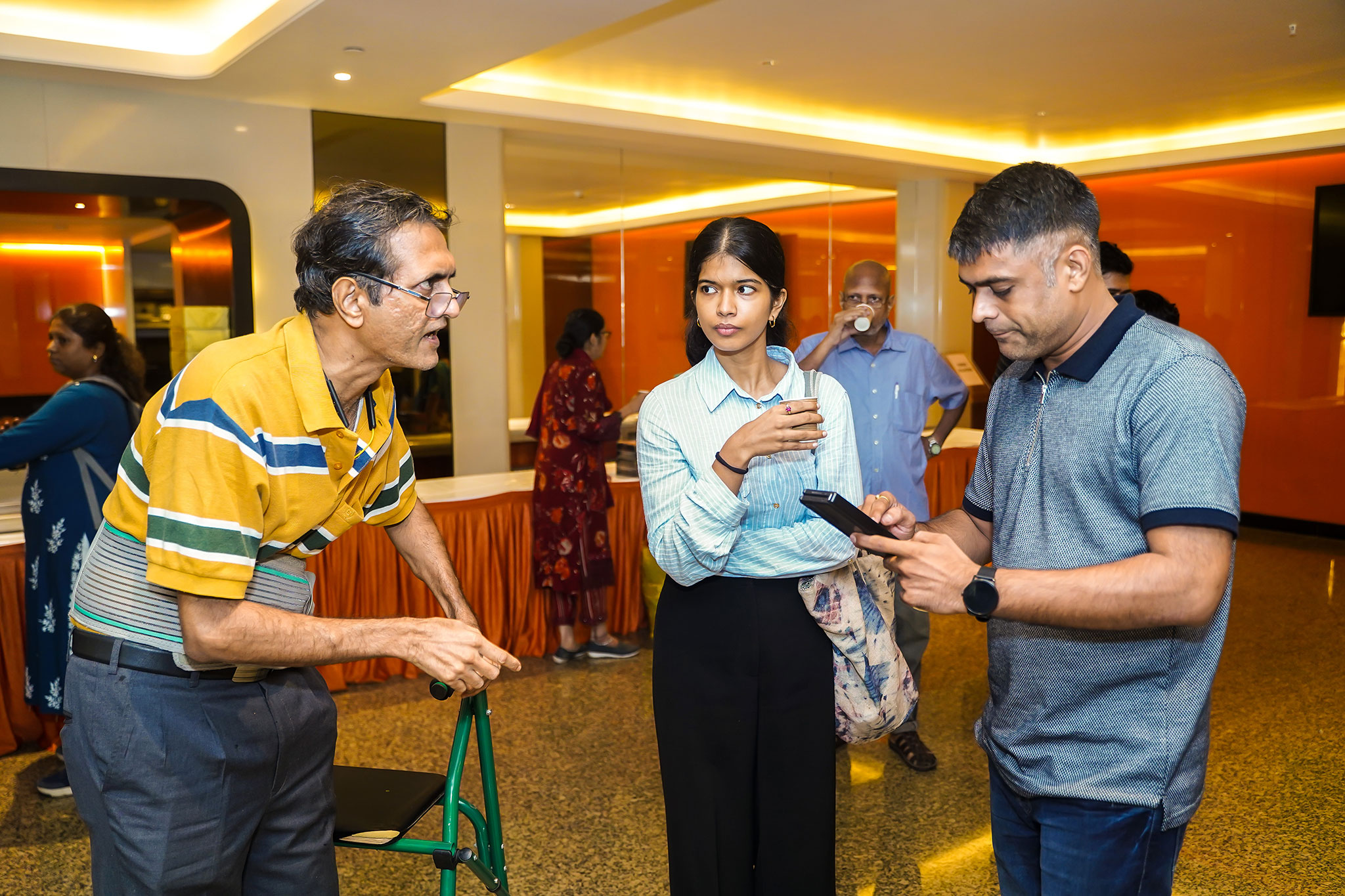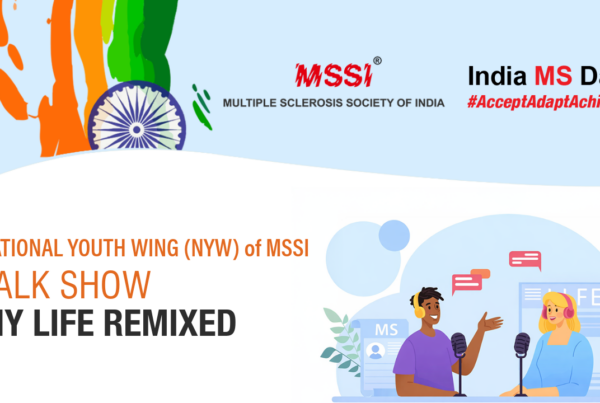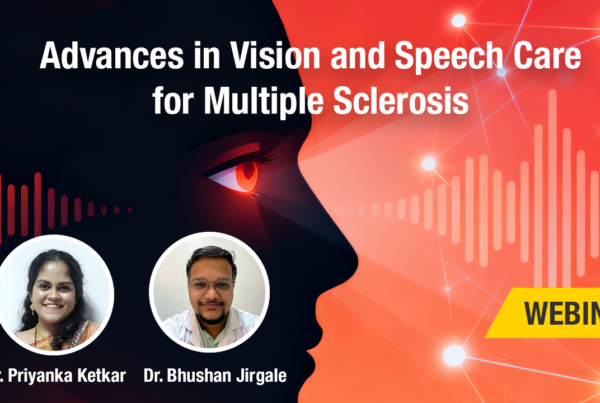
A Warm Start to a Meaningful Conversation
The Seminar commenced with a warm welcome from MSSI members. Ms. Kranti Munje, Secretary (Hon.), MSSI Mumbai Chapter, introduced the distinguished panel: Dr. B. S. Singhal, Director, Department of Neurology, Bombay Hospital and renowned MS expert; Dr. Satish Khadilkar, Dean, Department of Neurology, Bombay Hospital; Dr. Varsha Patil, Neurologist, Bombay Hospital; Dr. Rajeev Nerurkar, Senior ENT Surgeon, Bombay Hospital; Dr. Mrinal Pandit, Physiotherapist, Bombay Hospital; Dr. Dhaval Gosalia, Urologist, Bombay Hospital; Dr. Jharna Mahajan, Associate Consultant Neurologist, Bombay Hospital; and Mr. Sandeep Chitnis, National Secretary (Hon.), MSSI. Dr. Rekha Bhatkhande, Vice Chairperson (Hon.), MSSI, moderated the panel discussion. The program began with all dignitaries lighting the lamp, followed by singing of the national anthem. Dr. Rajkumar Patil, Medical Director, Bombay Hospital, delivered a keynote address.
Dr. B. S. Singhal welcomed all attendees and provided a comprehensive overview of multiple sclerosis, emphasising the role of willpower in managing the condition. He also acknowledged the invaluable work and support of MSSI to MSPs. Dr. Khadilkar welcomed the participants and discussed the evolving nature of MS, highlighting the significance of such discussions. He praised MSSI’s initiative and encouraged all attendees to actively participate in the discussion.
Multi-disciplinary Approach: Holistic MS Management
Presentation by Dr. B. S. Singhal
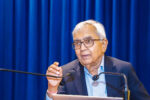 Dr. Singhal began the session by introducing Multiple Sclerosis (MS) as a disease of the central nervous system and an immune disorder. He explained demyelination and axonal degeneration, and discussed the global and Indian history of MS, as well as its progress in diagnosis. Dr. Singhal distinguished between MS and other demyelinating disorders that mimic MS. He noted that the onset of MS typically occurs in young people between the ages of 25 and 35, although it can also develop later in life. Women are more affected by MS than men. Dr. Singhal also explained concepts like gut microbiota and black holes. He discussed the different types of MS, including relapsing-remitting, secondary progressive, and primary progressive MS. Dr. Singhal discussed the availability of treatments for MS, including induction and escalating approaches. He also touched upon the point of pregnancy for people with MS and the safe MS treatments for pregnancy. Dr. Singhal spoke about the evolving scientific research in MS therapies and expressed optimism towards the development of more efficient medicines. Dr. Singhal emphasised the importance of the willpower of MS warriors and commended the rehabilitation efforts of MSSI.
Dr. Singhal began the session by introducing Multiple Sclerosis (MS) as a disease of the central nervous system and an immune disorder. He explained demyelination and axonal degeneration, and discussed the global and Indian history of MS, as well as its progress in diagnosis. Dr. Singhal distinguished between MS and other demyelinating disorders that mimic MS. He noted that the onset of MS typically occurs in young people between the ages of 25 and 35, although it can also develop later in life. Women are more affected by MS than men. Dr. Singhal also explained concepts like gut microbiota and black holes. He discussed the different types of MS, including relapsing-remitting, secondary progressive, and primary progressive MS. Dr. Singhal discussed the availability of treatments for MS, including induction and escalating approaches. He also touched upon the point of pregnancy for people with MS and the safe MS treatments for pregnancy. Dr. Singhal spoke about the evolving scientific research in MS therapies and expressed optimism towards the development of more efficient medicines. Dr. Singhal emphasised the importance of the willpower of MS warriors and commended the rehabilitation efforts of MSSI.
Presentation by Dr. Varsha Patil
 Dr. Varsha Patil outlined the various therapies available for managing Multiple Sclerosis (MS) in her speech. She discussed the progress made in developing DMTs and highlighted the availability of efficient DMTs at present. Dr. Patil emphasised the importance of early treatment and ongoing management of MS with appropriate therapies. She explained the injectable therapies, which are the earliest treatments for MS and are also considered safe for pregnancy. Dr. Patil further discussed first-line therapies, high-efficacy therapies, and induction therapies, emphasising that the choice of treatment depends on the individual’s specific circumstances. She also discussed monoclonal antibodies, anti-CD20 therapies, and the available options for these treatments. Before starting highly effective therapies, Dr. Patil explained that the patient must undergo immunisation to protect against various infections. Additionally, she discussed the safe pregnancy options available for people with MS. Dr. Patil concluded that the decision of treatment is a collaborative process between the doctor and the patient, considering the patient’s overall profile, the impact of any MS attacks, MRI reports, and any comorbidities.
Dr. Varsha Patil outlined the various therapies available for managing Multiple Sclerosis (MS) in her speech. She discussed the progress made in developing DMTs and highlighted the availability of efficient DMTs at present. Dr. Patil emphasised the importance of early treatment and ongoing management of MS with appropriate therapies. She explained the injectable therapies, which are the earliest treatments for MS and are also considered safe for pregnancy. Dr. Patil further discussed first-line therapies, high-efficacy therapies, and induction therapies, emphasising that the choice of treatment depends on the individual’s specific circumstances. She also discussed monoclonal antibodies, anti-CD20 therapies, and the available options for these treatments. Before starting highly effective therapies, Dr. Patil explained that the patient must undergo immunisation to protect against various infections. Additionally, she discussed the safe pregnancy options available for people with MS. Dr. Patil concluded that the decision of treatment is a collaborative process between the doctor and the patient, considering the patient’s overall profile, the impact of any MS attacks, MRI reports, and any comorbidities.

Panel Discussion
Dr. Rekha Bhatkhande began the panel discussion by asking Dr. Khadilkar how frequently RRMS transitions into SPMS. Dr. Khadilkar explained that almost all RRMS patients will progress into SPMS. He emphasised the importance of accepting this and acting swiftly and early. Dr. Khadilkar highlighted the significance of early treatment in responding to attacks and managing the disease.
Dr. Rekha asked Dr. Varsha Patil about highly effective therapies. Dr. Patil detailed the therapies, including induction and escalatory approaches, and emphasised the importance of customising them in each case, considering factors like economic considerations. She also explained that there’s no definitive answer to when to stop treatment. Dr. Rekha then raised the point of pregnancy in MS, and Dr. Patil explained the various aspects of pregnancy and MS. She clarified that MS is not hereditary and there are safe treatments available during pregnancy.
Dr. Jharna discussed various factors and barriers that patients encounter when choosing high-efficacy therapies. Dr. Rekha then asked her about the ophthalmological manifestations of MS. Dr. Jharna explained the different ophthalmological symptoms that patients may experience in the case of MS. As for clinical follow-ups, Dr. Jharna suggested 3-6 monthly follow-ups and annual MRIs for patients with a stable condition.
Dr. Rekha asked Dr. Rajeev about the ENT symptoms commonly associated with Multiple Sclerosis (MS). Dr. Rajeev explained that these symptoms can affect speech, hearing, and cause vertigo. Dr. Rekha then turned to Dr. Dhaval to discuss the urological implications of MS. Dr. Dhaval highlighted the impact of incontinence, storage, and pain on the quality of life of MSPs. He also provided solutions and exercises to manage these symptoms. Dr. Rekha then asked Dr. Mrinal about the role of physiotherapy in managing MS. Dr. Mrinal emphasised the importance of assessing each MSP’s situation and customising physiotherapy accordingly. He stressed the need for a graded protocol based on muscle strength and endurance, ensuring that patients don’t overexert themselves and exercise beyond fatigue. Dr. Rekha then turned to Mr. Sandeep Chitnis to discuss the work and support measures provided by the Multiple Sclerosis Society of India (MSSI). Mr. Chitnis explained MSSI’s role as a bridge between MSPs and government authorities, healthcare providers, and other stakeholders. He shared various initiatives, including rehabilitative support, financial assistance, and awareness campaigns. Notably, Mr. Chitnis also discussed MSSI’s advocacy work, including efforts to designate MS as a rare disease and secure insurance coverage. Mr. Chitnis concluded by expressing gratitude to all the dignitaries, Bombay Hospital, and the MSSI staff for the informative panel discussion.
Voices from the Community: Real Questions, Real Solutions
During an interactive Q&A session, experts discussed realistic patient scenarios and answered questions from participants covering a wide range of concerns. This exchange of information and solutions provided valuable insights into managing Multiple Sclerosis.
A Day of Knowledge, Hope, and Community
The event wrapped up with heartfelt thanks to Bombay Hospital and the MSSI team. Refreshments were provided, and special conveyance support was arranged for patients in need.
This panel was more than just a seminar, it was a celebration of strength, science and solidarity in the MS journey. It underscored the power of knowledge-sharing, early diagnosis, and the unwavering support of organisations like MSSI.


